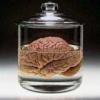Evolution is not a driving force, it's observation. It does not force or direct anything.
It seems that every time I talk about evolution, someone has to point that out

Of course I understand perfectly that evolution is not a 'driving force', it has no goal, it's just what we see as a result of genes combining, expressing, "surviving" or "extincting" depending on a number of impersonal, neutral factors. It's just that some times the phrasing even in books like the one I'm reading makes it a bit "foggy" to really grasp what's *really* going on. For instance, Dawkins talks about animals that "got out of the sea" into the land, and then went back into the sea(dolphins,whales). The instictive response when I read that is that some small population, for unknown reason, decided to literally get out of the water, and stay in land, where it got its legs, while I'm sure it's not quite what happened. I guess some creatures were out of necessity driven out of the water environment, maybe because of geological changes, and there those that their organs resembled legs more, got better chance at passing of the genes and resulting in a population with what we call "legs".
It's harder to imagine how we got from gills to lungs though; the book says that at one time all creatures lived in the sea. So, some animals with gills got out, for any reason, into land areas, and survived enough in order to substitute the gills with lungs? Which came first, the 'get out of sea' thing or the 'lung' thing? Did some species, while living solely in water, evolved into amphibians first, and then 'land animals'? How come? I imagine that, if we today we get all the fish(not dolphins or whales) of the earth somehow out of the water, all the billions of them would die in a matter of minutes or at least hours, without one exception, without some of them surviving in land long enough to produce other generations which would somehow 'adapt'. These are the stuff I have a harder time grasping.





